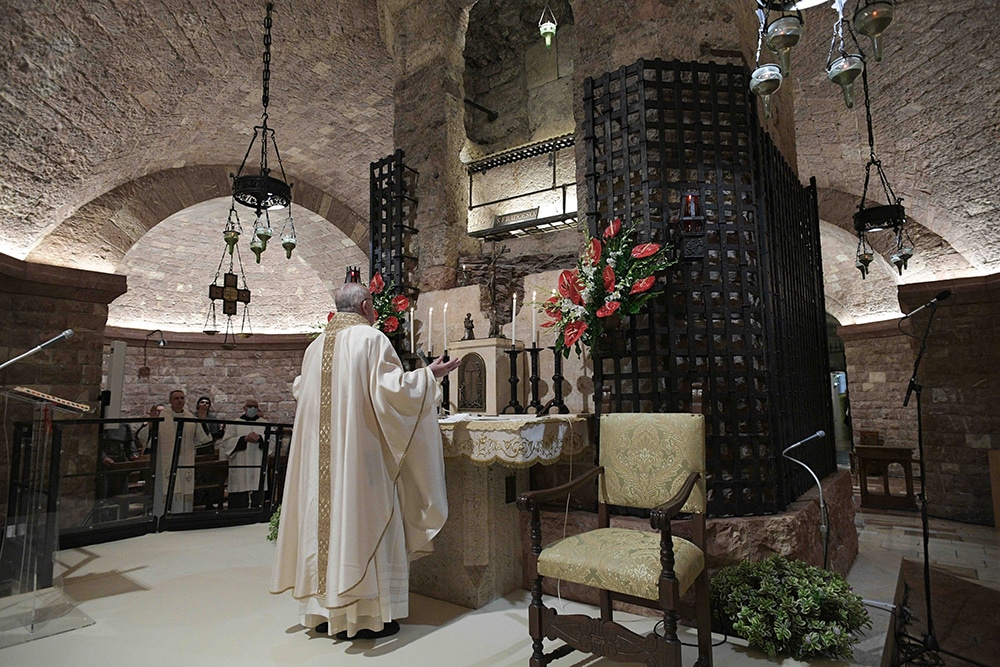 Question: Given the dispensation we are under, do we commit sin if we do not participate in the livestreamed Mass on Sunday?
Question: Given the dispensation we are under, do we commit sin if we do not participate in the livestreamed Mass on Sunday?
— Paul VanHoudt, Erie, Colorado
Answer: No, unless the local bishop has made watching a televised or recorded Mass a requirement, one does not commit a sin by failing to do so. Most bishops simply suspended the obligation to go to Mass as permitted in canon law. Most bishops certainly encouraged the faithful to keep Sunday as a day of special prayer. They could do this in ways deemed appropriate and possible for them. Hence, watching a televised Mass, or reading the Sunday readings reflectively, saying special prayers, novenas or devotions, and making a spiritual communion with the Lord, were ways to do this encouraged by bishops.
But to encourage is not the same as to require. Hence it is not sin if some or all of these things are omitted. To be avoided, however, is an attitude that casts aside all prayer or devotion on Sundays where Mass is not possible. If one can watch a televised or recorded Mass, why not do so? That it is not precisely required makes doing so an even greater act of faith. For a few, watching a televised Mass may not be advantageous, but surely some special time of prayer seems important and something that should be done even if not under pain of sin.
Inspired Scripture
Question: St. Paul writes, “in regard to virgins, I have no commandment from the Lord, but I give my opinion as one who by the Lord’s mercy is trustworthy” (1 Col 7:25). Does this mean that what he says is not inspired Scripture?
— Name, location withheld
Answer: No: “All scripture is inspired by God and is useful for teaching, for refutation, for correction, and for training in righteousness” (2 Tm 3:16). The Second Vatican Council declared, “For holy mother Church, relying on the belief of the Apostles (cf. Jn 20:31; 2 Tim 3:16; 2 Pt 1:19-20, 3:15-16), holds that the books of both the Old and New Testaments in their entirety, with all their parts, are sacred and canonical because written under the inspiration of the Holy Spirit, they have God as their author and have been handed on as such to the Church herself” (Dei Verbum, No. 11).
Therefore, a better way to understand Paul’s words are that, under the inspiration of the Holy Spirit, he is saying that there is some leeway in this matter which God permits.
In the passage you cite, Paul is answering some questions the Corinthians had about celibacy, virginity and marriage, given the difficulties of the times in which they were living. In some matters, Paul indicates that God has clearly commanded us. For example: “To the married, however, I give this instruction (not I, but the Lord): A wife should not separate from her husband — and if she does separate she must either remain single or become reconciled to her husband — and a husband should not divorce his wife” (1 Cor 7:10-11). In other places, as you note, there is no direct command from God, and thus prudential judgments can be made. So the inspired text teaches infallibly that some matters are subject to direct divine command and teaching, whereas other matters allow for some personal decisions.
Christ’s humanity and divinity
Question: A Protestant friend said only Jesus’ humanity and not divinity carried the cross. I said that doesn’t sound right since you can’t separate his humanity from his divinity.
— Todd Miller, Woodstock, Illinois
Answer: There are certain things, such as suffering, that pertain to Jesus’ humanity. Other things, such as miracles that pertain to his divinity. There are also some actions that involve both natures, and this is called “theandric action” (theo meaning “God” and andros meaning “man”). Jesus’ divine nature cannot suffer, so it is possible to ascribe the carrying of the cross to his humanity. However as you note, we ought not forget that Jesus unites the natures in his one person. Hence the full act of salvation requires both natures, even if certain things — for example, suffering — are ascribed to the human nature and the power to save is ascribed to the divine nature. We are saved by the human decision of a divine person. In this sense the full act of salvation is a theandric action wherein what is proper to each nature is united in the one person who is Christ.
Msgr. Charles Pope is the pastor of Holy Comforter-St. Cyprian in Washington, D.C., and writes for the Archdiocese of Washington, D.C. at blog.adw.org. Send questions to msgrpope@osv.com.







